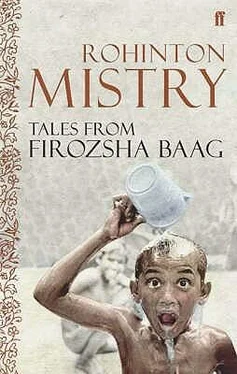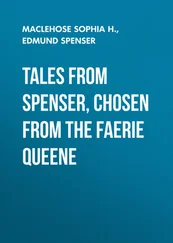Rohinton Mistry - Tales From Firozsha Baag
Здесь есть возможность читать онлайн «Rohinton Mistry - Tales From Firozsha Baag» весь текст электронной книги совершенно бесплатно (целиком полную версию без сокращений). В некоторых случаях можно слушать аудио, скачать через торрент в формате fb2 и присутствует краткое содержание. Год выпуска: 2006, Издательство: Faber & Faber, Жанр: Современная проза, на английском языке. Описание произведения, (предисловие) а так же отзывы посетителей доступны на портале библиотеки ЛибКат.
- Название:Tales From Firozsha Baag
- Автор:
- Издательство:Faber & Faber
- Жанр:
- Год:2006
- ISBN:нет данных
- Рейтинг книги:3 / 5. Голосов: 1
-
Избранное:Добавить в избранное
- Отзывы:
-
Ваша оценка:
- 60
- 1
- 2
- 3
- 4
- 5
Tales From Firozsha Baag: краткое содержание, описание и аннотация
Предлагаем к чтению аннотацию, описание, краткое содержание или предисловие (зависит от того, что написал сам автор книги «Tales From Firozsha Baag»). Если вы не нашли необходимую информацию о книге — напишите в комментариях, мы постараемся отыскать её.
Tales From Firozsha Baag — читать онлайн бесплатно полную книгу (весь текст) целиком
Ниже представлен текст книги, разбитый по страницам. Система сохранения места последней прочитанной страницы, позволяет с удобством читать онлайн бесплатно книгу «Tales From Firozsha Baag», без необходимости каждый раз заново искать на чём Вы остановились. Поставьте закладку, и сможете в любой момент перейти на страницу, на которой закончили чтение.
Интервал:
Закладка:
Rustomji chuckled now as he remembered the incident. He filled the copper vessel with fresh water and hoisted it onto the gas stove. The burner hesitated before it caught. He suspected the gas cylinder was about to run out; over a week ago he had telephoned the blasted gas company to deliver a new one. He wondered if there was going to be another shortage, like last year, when they had had to burn coals in a sign- the weekly quota of kerosene had been barely enough to make the morning tea.
Tea, thank God for tea, he thought, anticipating with pleasure the second cup Mehroo had promised. He would drink it in copious draughts, piping hot, one continuous flow from cup to saucer to mouth. It just might induce his offended bowels to move and salvage something of this ill-omened morning. Of course, there was the WC of Hirabai Hansotia’s that he would have to contend with — his bowels were recalcitrant in strange surroundings. It was a matter of waiting and seeing which would prevail: Mehroo’s laxative tea or Hirabai’s sphincter-tightening lavatory.
He picked up the Times of India and settled in his easy chair, waiting for the bath water to boil. Something would have to be done about the peeling paint and plaster; in some places the erosion was so bad, red brick lay exposed. The story went that these flats had been erected in an incredibly short time and with very little money. Cheap materials had been used, and sand carted from nearby Chaupatty beach had been mixed in abundance with substandard cement. Now during the monsoon season beads of moisture trickled down the walls, like sweat down a coolie’s back, which considerably hastened the crumbling of paint and plaster.
From time to time, Mehroo pointed out the worsening problem, and Rustomji took refuge in railing at the trustees. But today he did not need to worry. She would never mention it on a day like Behram roje . There was not any time for argument. Her morning had started early: she had got the children ready for school and packed their lunch; cooked dhandar-paatyo and sali-boti for dinner; starched and ironed his white shirt, trousers, and dugli , all washed the night before, and her white blouse, petticoat and sari; and now those infernal people upstairs had made the WC leak. If Gajra, their gunga , did not arrive soon, Mehroo would also have to sweep and mop before she could decorate the entrance with coloured chalk designs, hang up the tohrun (waiting since the flowerwalla’s six A.M. delivery) and spread the fragrance of loban through the flat — it was considered unlucky to omit or change the prescribed sequence of these things.
But celebrating in this manner was Mehroo’s own choice. As far as Rustomji was concerned, these customs were dead and meaningless. Besides, he had repeatedly explained to her what he called the psychology of gungas: “If a particular day is important, never let the gunga know, pretend everything is normal. And never, never ask her to come earlier than usual, for she will deliberately come late.” But Mehroo did not learn; she trusted, confided, and continued to suffer.
Gajra was the latest in a long line of gungas to toil at their house. Before her it had been Tanoo.
For two years, Tanoo came every morning to their flat to sweep and mop, do the dishes, and wash their clothes. A woman in her early seventies, tall and skinny, she was bow-legged and half blind, with an astonishing quantity of wrinkles on her face and limbs. Where her skin was not wrinkled, it was scaly and rough. She had large ears that stuck out under wisps of stringy, coconut-oiled grey hair, and wore spectacles (one lens of which was missing) balanced precariously on a thin pointed nose.
The trouble with Tanoo was that she was always breaking a dish or a cup or a saucer. Mehroo was prepared to overlook the inferior sweeping and mopping; the breakage, however, was a tangible loss which Rustomji said would one day ruin them if a stop was not put to it.
Tanoo was periodically threatened with pay cuts and other grimmer forms of retribution. But despite her good intentions and avowals and resolutions, there was never any improvement. Her dim eyes were further handicapped by hands which shook and fumbled because of old age and the long unhappiness of a life out of which her husband had fled after bringing into it two sons she single-handedly had to raise, and who were now drunkards, lazy good-for-nothings, and the sorrow of her old age.
“Poor, poor Tanoo,” Mehroo would say, helpless to do anything. “Very sad,” Rustomji would agree, but would not do more.
So plates and saucers continued to slip out of Tanoo’s old, weary hands, continued to crash and shatter, causing Rustomji fiscal grief and Mehroo sorrow — sorrow because she knew that Tanoo would have to go. Rustomji too would have liked to feel sorrow and compassion. But he was afraid. He had decided long ago that this was no country for sorrow or compassion or pity — these were worthless and, at best, inappropriate.
There was a time during his college days, as a volunteer with the Social Service League, when he had thought differently (foolishly, he now felt). Sometimes, he still remembered those SSL camps fondly, the long train rides full of singing and merriment to remote villages lacking the most basic of necessities, where they dug roads and wells, built schoolhouses, and taught the villagers. Hard work, all of it, and yet so much fun, what a wonderful gang they had been, like Dara the Daredevil, the way he jumped in and out of moving trains, he called himself the Tom Mix of the locomotive; and Bajun the Banana Champion — at one camp he had eaten twenty-one of them, not small ailchee ones either, regular long green ones; every one had been a real character.
But Rustomji was not one to allow nostalgia to taint the colour of things as he saw them now. He was glad he had put it all behind him.
The way it ended for Tanoo, however, eased the blow a little for Mehroo. Tanoo arranged to leave Bombay and return to the village she had left so long ago, to end her days with her sister’s family there. Mehroo was happy for her. Rustomji heaved a sigh of relief. He had no objections when Mehroo gave her generous gifts at the time of parting. He even suggested getting her a new pair of spectacles. But Tanoo declined the offer, saying she would not have much use for them in the village, with no china plates and saucers to wash.
And so, Tanoo departed and Gajra arrived: young and luscious, and notorious for tardiness.
Coconut hair oil was the only thing Gajra had in common with Tanoo. She was, despite her plumpness, quite pretty; she was, Rustomji secretly thought, voluptuous. And he did not tire of going into the kitchen while Gajra was washing dishes, crouched on her haunches within the parapet of the mori . When still a young boy, Rustomji had heard that most gungas had no use for underwear — neither brassiere or knickers. He had confirmed this several times through observation as a lad in his father’s house. Gajra provided further proof, proof which popped out from beneath her short blouse during the exertion of sweeping or washing. With a deft movement she would tuck back the ample bosom into her choli , unabashed, but not before Rustomji had gazed his fill. Like two prime Ratnagiri mangoes they were, he felt, juicy and golden smooth.
“Her cups runneth over,” he would then gleefully think, remembering time and time again the little joke from his beloved school days at St. Xavier’s. Though not given to proselytizing, the school had a custom of acquainting all its students, Catholic or otherwise, with the Lord’s Prayer and the more popular Psalms.
Rustomji’s one fervent wish was that some day Gajra’s breasts should slip out far enough from under her choli to reveal her nipples. “Dada Ormuzd , just once let me see them, only once,” he would yearn in his depths, trying to picture the nipples: now dark brown and the size of a gram but with the hidden power to swell; now uncontrollably aroused and black, large and pointed.
Читать дальшеИнтервал:
Закладка:
Похожие книги на «Tales From Firozsha Baag»
Представляем Вашему вниманию похожие книги на «Tales From Firozsha Baag» списком для выбора. Мы отобрали схожую по названию и смыслу литературу в надежде предоставить читателям больше вариантов отыскать новые, интересные, ещё непрочитанные произведения.
Обсуждение, отзывы о книге «Tales From Firozsha Baag» и просто собственные мнения читателей. Оставьте ваши комментарии, напишите, что Вы думаете о произведении, его смысле или главных героях. Укажите что конкретно понравилось, а что нет, и почему Вы так считаете.












